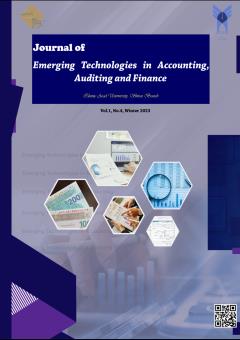The Impact of Debt, Taxation and Financial Crisis on Earnings Management
محورهای موضوعی : • Emerging technology in the field of Accounting and its futureMahrokh Rostami 1 , Hadi Abdi Taleb Begi 2
1 - Master's student in accounting, Fatemieh Institute of Higher Education, Shiraz
2 - Instructor of accounting department, Fatemieh Institute of Higher Education, Shiraz, Iran.
کلید واژه: Debt, Financial Crisis, Profit Management, Taxation, Financial Statement Frau.,
چکیده مقاله :
Objectives: The present study aims to investigate the impact of debt, taxation and financial crisis on earnings management . Design/methodology/approach: This research is applied and from the methodological dimension is causal correlation. The statistical population of this study was all companies listed in Tehran Stock Exchange and using systematic deletion sampling method, 138 companies were selected as the sample and were studied during the 8-year period between 2015 and 2022. Results: Four hypotheses were proposed for the present study. The results of testing the research hypotheses showed that financial crisis and corporate tax had a direct impact on the company's earnings management, but debt did not affect the company's earnings management. Originality/value: The current research provided evidence that dealing with the financial crisis and paying taxes are the main factors in increasing earnings management in companies.
Refrences
Ahmad Pour, Ahmad, Shahsavari, Masoumeh, (2014).Earnings Management and the Impact of Earnings Quality on the Future Profitability of Bankrupt Companies of Tehran Stock Exchange.quarterly Journal of Empirical Studies of Financial Accounting, Vol. 11, No . 41.
Ali, A. and Bansal, M. (2021), "Impact of upward and downward earnings management on stock returns", South Asian Journal of Business Studies, Vol. ahead-of-print No. ahead-of-print. https://doi.org/10.1108/SAJBS-12-2020-0417
Almarayeh, T., Abdullatif, M. and Aibar-Guzmán, B. (2022), "The role of audit committees in mitigating earnings management: evidence from Jordan", Journal of Accounting in Emerging Economies, Vol. ahead-of-print No. ahead-of-print. https://doi.org/10.1108/JAEE-09-2020-0235.
Altman, E. I. (1968). Financial ratios, discriminant analysis and the prediction of corporate bankruptcyJournalofFinance,23,589–609.
Alzoubi, E.S. (2018), “Audit quality, debt financing, and earnings management: evidence from Jordan”, Journal of International Accounting, Auditing and Taxation, Vol. 30, pp. 69-84.
Aqabna, S.M.; Aga, M.; Jabari, H.N. Firm Performance,Corporate Social Responsibility andthe Impact of Earnings Managementduring COVID-19: Evidence fromMENA Region. Sustainability.15(48).356-371.
Cohen, D.A. Dey, A. and Lys, T.Z. (2008). Real and accrual-based earnings management in the pre- and post-sarbanes oxley periods. The Accounting Review, 83, 757-788.
Costa, L., Cerqueira, A. and Brand~ao, E. (2016), “The impact of financial crisis on earnings management: evidence from EU-25”, FEP working paper No. 578.
Dhole, S., Manchiraju, H., & Suk, I. (2016). CEO Inside Debt and Earnings Management. Journal of Accounting, Auditing & Finance, 31(4), 515-550. https://doi.org/10.1177/0148558X15596907
Ebrahimi, Mehrnoosh, Hajiha, Zohreh, Shahverdiani, Shadi, Kordlouei, Hamidreza Hanifi, Farhad (2021) Identification of the most important factors affecting real and committed earnings management in the capital market with Bayesian Models. Financial Engineering and Securities Management, No. 48, pp. 109-142.
Fan, J. Zhang, Y. Liu, Q. 2013. Internal control, auditor industry expertise, accrual and real earnings management. Account. Res. 4, 81-96 (in Chinese). Fang, H. Jin, Y. 2011.
Franz, D.R., HassabElnaby, H.R. & Lobo, G.J. Impact of proximity to debt covenant violation on earnings management. Rev Account Stud 19, 473–505 (2014). https://doi.org/10.1007/s11142-013-9252-9
Gunny, K.A. 2010. The relation between earnings management using real activities manipulation and future performance: Evidence from meeting earnings benchmarks. Contemp. Account. Res. 27, 855-888.
Gupta, S., Laux, R.C. and Lynch, D.P. (2016), “Do firms use tax reserves to meet analysts’ forecasts? Evidence from the pre- and post-FIN 48 periods”, Contemporary Accounting Research, Vol. 33 No. 3, pp. 1044-1074
Huang, H.Y. and Ho, K.C. (2020), “Liquidity, earnings management, and stock expected returns”, TheNorth American Journal of Economics and Finance, Vol. 54, p. 101261
Izadinia, N.; Mansourfar, Gholamreza; Rashidi Khazaei, M., (2015) Financial Distress as a Factor for Earnings Management. Financial Strategy Journal of Alzahra University. Third year. Issue 10 pp. 25-47
Kim, Y., Park, M.S. and Wier, B. (2012), “Is earnings quality associated with corporate social responsibility?”, The Accounting Review, Vol. 87 No. 3, pp. 761-796.
Kuo, J.-M., Ning, L. and Song, X. (2014), “The real and accrual-based earnings management behaviors: evidence from the split share structure reform in China”, International Journal of Accounting, Vol. 49 No. 1, pp. 101-136.
Mamatzakis, E., Pegkas, P. and Staikouras, C. (2023), "The impact of debt, taxation and financial crisis on earnings management: the case of Greece", Managerial Finance, Vol. 49 No. 1, pp. 110-134. https://doi.org/10.1108/MF-01-2022-0052
Mechelli, A. and Cimini, R. (2017), “Accounting conservatism and risk culture”, in Risk Culture in Banking, Palgrave Macmillan, Cham, pp. 387-401.
Pereira, A. and Alves, M. (2017), “Earnings management and European Regulation 1606/2002: evidence from non-financial Portuguese companies listed in Euronext”, Spanish Accounting Review, Vol. 20 No. 2, pp. 107-117.
Roni, A. . (2022). The Effect Of Tax Planning On Profit Management In Listed Companies In Jakarta Islamic Index Period 2016-2018. International Journal of Management and Digital Business, 1(1), 52–60. https://doi.org/10.54099/ijmdb.v1i1.325.
Xu, H. Lin, Z. Wang, X. 2015. Relationship-based transaction, internal control and earnings management: empirical evidence from accrual and real earnings management. J. Account. Econ. 3(5), 57-77.
Yuanhui Li, Xiao Li, Erwei Xiang, Hadrian Geri Djajadikerta)2020(Financial Distress, Internal Control, and Earnings Management: Evidencefrom China. Journal of Contemporary Accounting & Econom‐ics S1815-5669(20)30024-2.PP 1- 48.
Zang, A.Y. (2012), “Evidence on the trade-off between real activities manipulation and accrual-based earnings management”, The Accounting Review, Vol. 87 No. 2, pp. 675-703.


